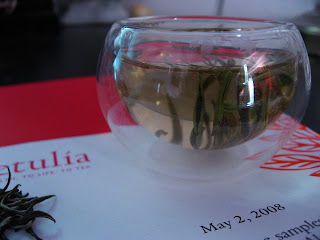
Bangladesh. A rather odd growing region for tea. I've actually never heard of a tea coming out of Bangladesh. When I got a message from a representative of Tetulia, I was excited to try a tea from this area. It's always a pleasure to try new and different things, which unfortunately become harder to find as time goes on. Tetulia is a company that participates in an interesting co-op program in poor Bangladesh:
Co-op members receive a milking cow, for which they pay back not in cash, but with milk and cow dung. Members pay only one liter of milk per day, keeping the rest for their children and the calves. They pay 10 to 20 kgs of cow dung per day, keeping a measure for their own use. Most members manage to pay off their cow within two to three years. Best of all, they keep any calves that the cows bear!I think this is an amazing idea, one that should become widespread in less well-off nations.
The tea I received was an all-tip, 100% bud white tea, which is the only kind I drink nowadays. The leaf isn't the furry-white that I love to find, but rather has some green leaves.aph

Brewing it up at 180°f for 5 minutes gave me an orange-amber soup. The tea's aroma carries some berry and an interesting grassy/melon. The grassy/melon aroma follows the tea into the taste, resulting in a quite individual brew. The flavor profile is similar to that characteristic of Darjeeling teas, but the individuality of this tea is found in the grassy-melon that permeates in smell and taste. Like a cantaloupe field at high-noon, or a cooked plate of snap peas, sprout, and cucumber. Also noted is a hint of astringency. This tea would lend itself better to a shorter, 3-4 minute steep.
The glass-brewed cup, shown in the picture, got steeped at a lower temperature for indefinite time. The taste of this cup is smoothly-sweet, non-astringent, and more melon than anything else. Following the melon is slight embodiment of snap peas and hay.

In retrospect, this tea isn't amazing, but it is good for an organic tea from a region that isn't known for growing tea. Also, when you drink this tea, you can feel proud, knowing that you are supporting struggling people in an extremely poor country (Bangladesh's GDP/capita being 1/33 of that of the USA). Tetulia's tea garden was planted only in 2000, so I expect their tea to get better in the coming years, as the plants grow and adapt, and as the processors gain more experience with this new crop.
0 comments:
Post a Comment